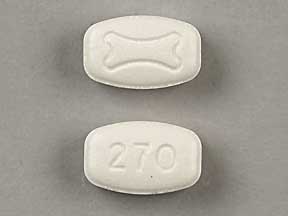Alendronate/cholecalciferol and Alcohol/Food Interactions
There are 3 alcohol/food/lifestyle interactions with alendronate / cholecalciferol.
Multivitamins With Minerals Alendronate
Moderate Drug Interaction
Alendronate and multivitamin with minerals should not be taken orally at the same time. Products that contain magnesium, aluminum, calcium, iron, and/or other minerals may interfere with the absorption of alendronate into the bloodstream and reduce its effectiveness. You should take multivitamin with minerals at least 30 minutes after the alendronate dose. Talk to a healthcare professional if you are not sure whether a product contains something that could potentially interact with your medication or if you have questions on how to take this or other medications you are prescribed. It is important to tell your doctor about all other medications you use, including vitamins and herbs. Do not stop using any medications without first talking to your doctor.
Cholecalciferol Food/Lifestyle
Moderate Food Interaction
Consumer information for this interaction is not currently available.
MONITOR: Additive effects and possible toxicity (e.g., hypercalcemia, hypercalciuria, and/or hyperphosphatemia) may occur when patients using vitamin D and/or vitamin D analogs ingest a diet high in vitamin D, calcium, and/or phosphorus. The biologically active forms of vitamin D stimulate intestinal absorption of calcium and phosphorus. This may be helpful in patients with hypocalcemia and/or hypophosphatemia. However, sudden increases in calcium or phosphorus consumption due to dietary changes could precipitate hypercalcemia and/or hyperphosphatemia. Patients with certain disease states, such as impaired renal function, may be more susceptible to toxic side effects like ectopic calcification. On the other hand, if dietary calcium is inadequate for the body's needs, the active form of vitamin D will stimulate osteoclasts to pull calcium from the bones. This may be detrimental in a patient with reduced bone density.
MANAGEMENT: Given the narrow therapeutic index of vitamin D and vitamin D analogs, the amounts of calcium, phosphorus, and vitamin D present in the patient's diet may need to be taken into consideration. Specific dietary guidance should be discussed with the patient and regular lab work should be monitored as indicated. Calcium, phosphorus, and vitamin D levels should be kept within the desired ranges, which may differ depending on the patient's condition. Patients should also be counseled on the signs and symptoms of hypervitaminosis D, hypercalcemia, and/or hyperphosphatemia.
Alendronate Food/Lifestyle
Moderate Food Interaction
Consumer information for this interaction is not currently available.
ADJUST DOSING INTERVAL: Food significantly decreases the bioavailability of alendronate, possibly to negligible levels.
MANAGEMENT: Alendronate should be administered with 6 to 8 ounces of plain water, at least 30 minutes before the first food, beverage, or medication of the day. Patients should remain upright for at least 30 minutes following administration of alendronate.
Switch to professional interaction data
Alendronate/cholecalciferol drug interactions
There are 185 drug interactions with alendronate / cholecalciferol.
Alendronate/cholecalciferol disease interactions
There are 12 disease interactions with alendronate / cholecalciferol which include:
- aspiration
- ONJ
- hypocalcemia
- upper GI mucosal irritation
- arrhythmia
- electrolyte imbalance
- hypercalcemia
- renal dysfunction
- CV
- renal dysfunction
- asthma
- hepatobiliary dysfunction
More about alendronate / cholecalciferol
- alendronate/cholecalciferol consumer information
- Check interactions
- Compare alternatives
- Reviews (1)
- Side effects
- Dosage information
- During pregnancy
- Drug class: bisphosphonates
- En español
Related treatment guides
Drug Interaction Classification
| Highly clinically significant. Avoid combinations; the risk of the interaction outweighs the benefit. | |
| Moderately clinically significant. Usually avoid combinations; use it only under special circumstances. | |
| Minimally clinically significant. Minimize risk; assess risk and consider an alternative drug, take steps to circumvent the interaction risk and/or institute a monitoring plan. | |
| No interaction information available. |
See also:
Further information
Always consult your healthcare provider to ensure the information displayed on this page applies to your personal circumstances.


